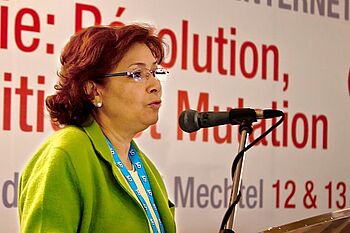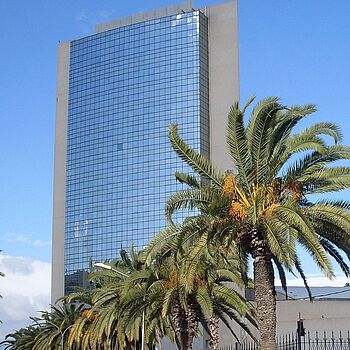The Tunisian Minister of the Interior, Hédi Majdoub, greets the Commission for Truth and Dignity in 2016. Chaired by journalist Sine Bensedrine, it spent five years investigating human rights violations in Tunisia. It collected material on 62,720 cases and published a six-volume final report in 2019. To date, however, criminal investigations have been conducted on less than 200 cases. This has led many analysts to become rather critical of how Tunisia has handled its examination of the past.
Credit: interieur.gov.tn CC BY
How the Truth Commission fell Victim to the Parties

Hearings were an important instrument in Tunisia’s transitional justice process. The Commission for Truth and Dignity put twelve public hearings on the Internet. On March 31, 2019, after five years of work, it presented its final report. Yasmine Jamal Hajar used this occasion to describe how the work of the Commission had been appropriated and complicated by the Tunisian parties.
“The 17th of November 2016 is a notable date in the modern history of Tunisia. The Truth and Dignity Commission (Instance Verité et Dignité, IVD) held its first public hearing. Tunisia is among 44 countries that established such a commission to undertake a transitional justice process, to put an end to a period of conflict and to endorse the onset of a democratic transition. Consequently, this historic moment was celebrated by being broadcast on international TV and by the attendance of national and international public figures. Among them were heads of commissions and bodies with similar missions from several countries around the world.” Read more
Link
Website of the Tunisian Truth Commission
After the Dictatorship. Instruments of Transitional Justice in Former Authoritarian Systems – An International Comparison
A project at the Department of Modern History at the University of Würzburg
Twitter: @afterdictatorship
Instagram: After the dictatorship
With financial support from the German Federal Ministry for Economic Cooperation and Development
Learning from Tunisia

The larger-than-life portrait of the Tunisian dictator Zine el-Abidine Ben Ali is taken down. After his overthrow in 2011, human rights activists and politicians worked to achieve transitional justice. They were advised and supported by foreign partners. In September 2018, political scientist Mariam Salehi analyzed why transitional justice in Tunisia came to a standstill.
“Tunisia is a paradigmatic case of how transitional justice is currently being implemented. After the fall of the regime of former ruler Ben Ali, international experts developed the Transitional Justice Law together with Tunisian political and civil society actors. The aim was to address not only political human rights violations, but also socioeconomic factors of authoritarian rule. The participatory approach and the broad mandate are often considered exemplary. Nonetheless, various conflicts of interest and dilemmas confronting external actors are also evident here.” Read more (German)
Truth and Justice

Credit: fhimt.com / CC BY
In May 2014, the journalist Sihem Bensedrine became chair of the nine-member Commission for Truth and Dignity in Tunisia. Its task was to investigate human rights violations since 1955. Her work was supported by regional offices, committees and a ministry of transitional justice. While the moderate Islamist Ennahda Party focused on compensating the victims, secular forces were more concerned with criminal investigations and historical research. In an article from November 2014, political scientist Mariam Salehi outlines the different approaches.
“Among the Arab Spring states, Tunisia has thus far been considered a model example of a country on the way to a stable democracy. Since the revolution in 2011, however, the focus has been on transitional justice and shaping the future ‘face’ of the Tunisian state. Because how the past is interpreted bears great importance for the present and the future.”
Read more (German)
Transitional Justice – The Example of Tunisia

Credit: M. Rais
The architecture of the huge party headquarters of the Tunisian state party RCD was meant to underscore its power. But the party was banned in March 2011, just shortly after the revolution. The political fragmentation of society has complicated efforts to address the last 50 years of dictatorship. Personnel changes only took place at the top of the state institutions. And very few of those responsible have been brought to justice under criminal law. Two and a half years after dictator Ben Ali fled, journalist Sarah Mersch takes stock of the transitional justice process in Tunisia.
“Almost two and a half years after the uprising in Tunisia, the country is at an impasse in its search for the ‘Tunisian way’ of transitional justice invoked by government and civil society alike. After initial approaches in the immediate aftermath of the revolt, the public debate has now largely fallen silent and the behind-the-scenes atmosphere has become increasingly politicized. A draft law that shows a possible way for Tunisia to address its past is ready for a vote, but the discussion in parliament has been delayed.” Read more (German)